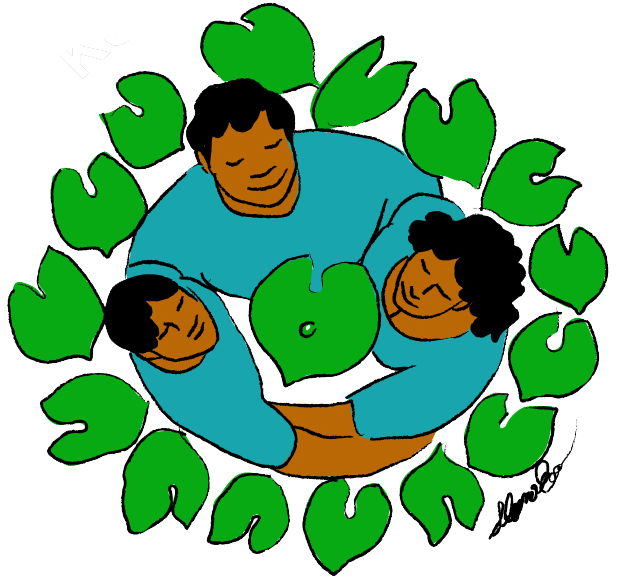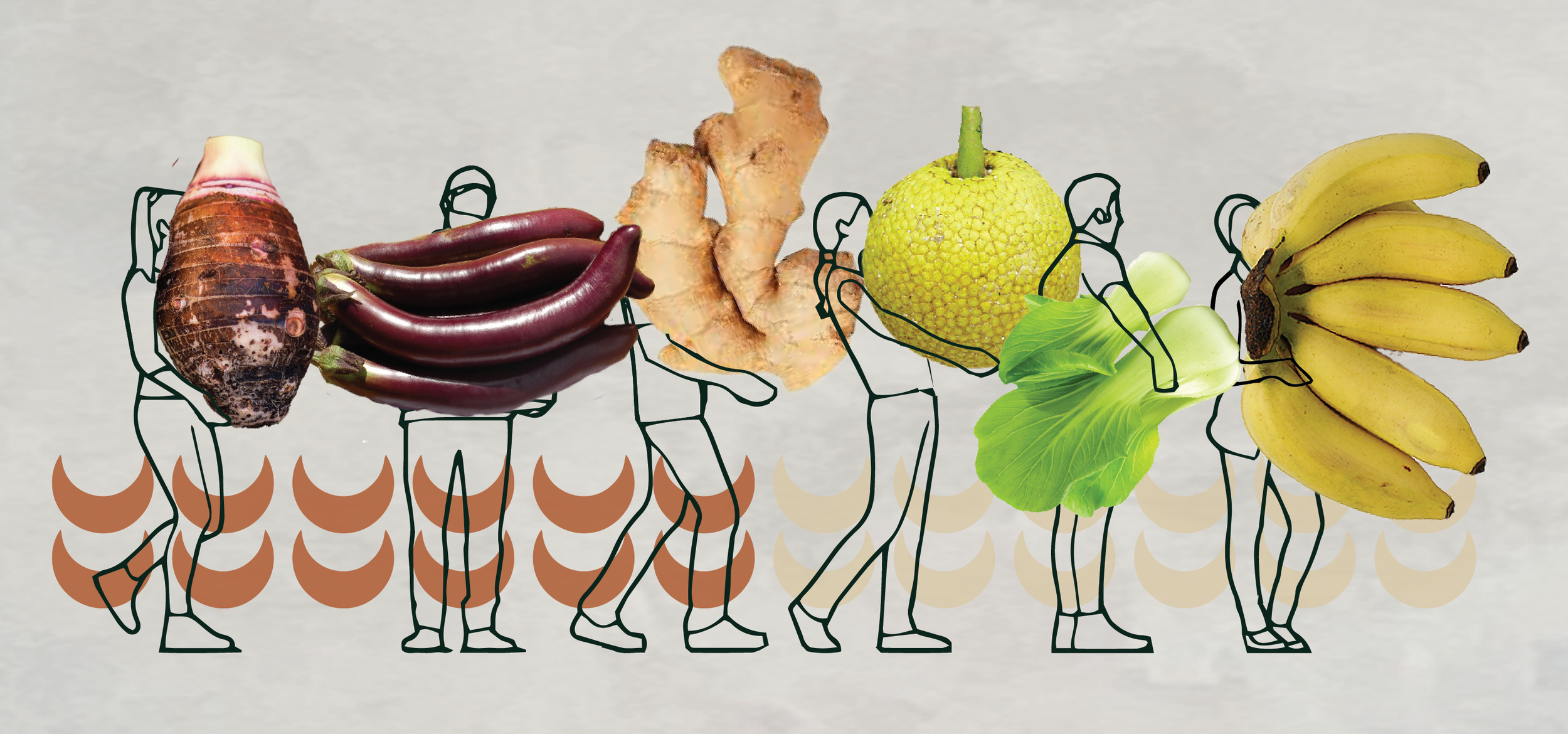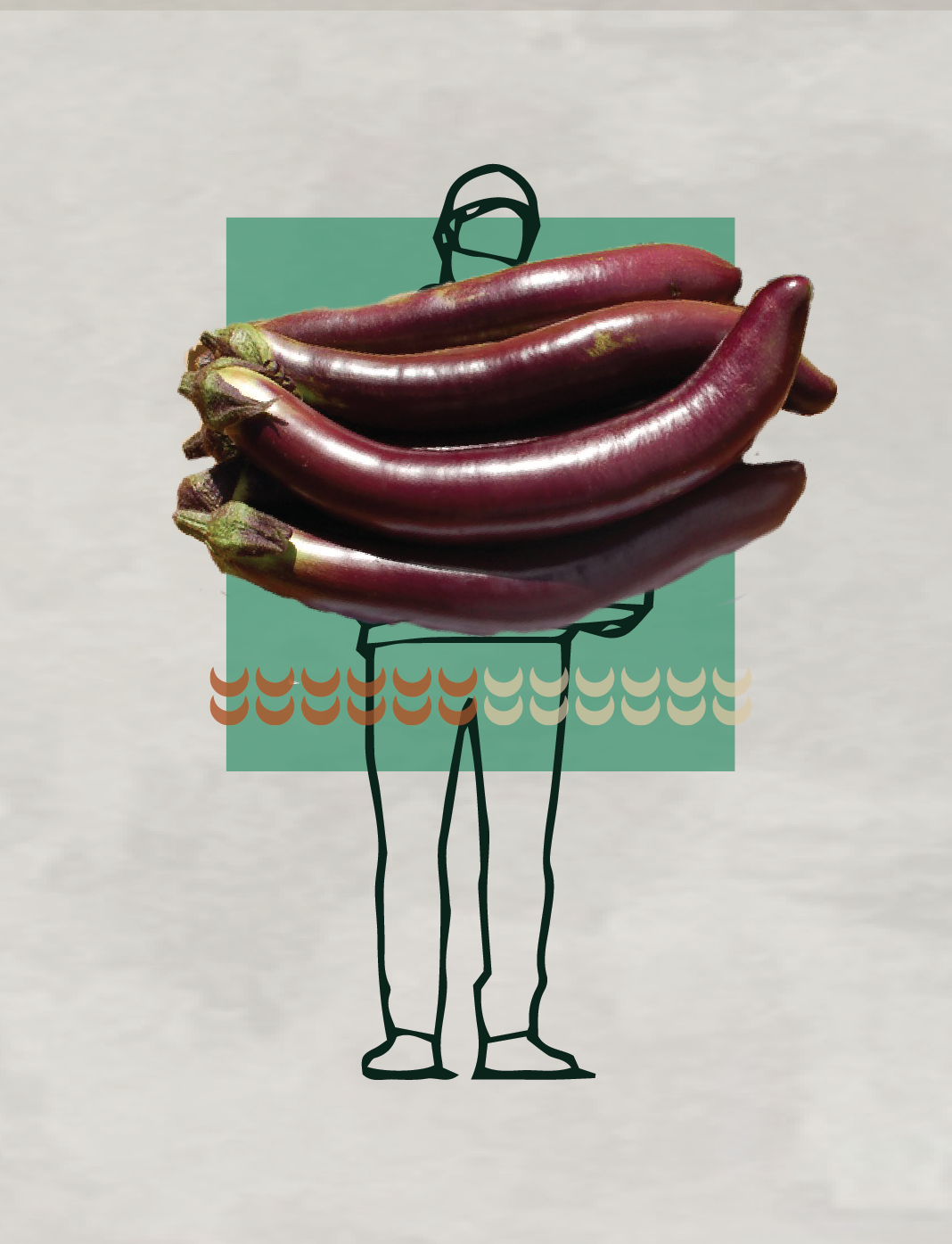Connection Through Food
Artwork by KKV Communications Team.
This is the second in a series of stories where we explore what ancestral abundance looks like and ponder the question: Should access to healthy food be a human right? We’d be honored if you’d join in the conversation here and on our social media platforms (Instagram/Facebook) to uplift KKV programs, such as Healing Our Food Systems. Together we can continue connecting people to ʻāina and health. Click here to read the first installment of our Healing Our Food Systems series.
The grant-funded Healing Our Food Systems program has helped more than a thousand Kalihi households put healthy food on the table, as individuals worked to get back on their feet following the COVID pandemic. When it first launched in August 2022, the program was granted $100,000 from the City and County direct relief fund. All of that money went toward purchasing produce from the Hawaiʻi Food Bank. Once those funds began to dwindle, the program received a six-week extension from Nā Makawai, a program aimed at benefitting the health of Native Hawaiians after the pandemic. During this extension, Hui Hoaka worked with Roots to source the distribution’s fruits and vegetables from Kahumana Farms. The program aimed to provide fresh food for 20 households per week. Thousands of people, from keiki to kupuna, were given access to fresh, healthy food. Unfortunately, the program ran out of funding in July 2023.
Artwork by KKV Communications Team.
There are so many other factors that can affect a person’s health. From easing stress to assisting with financial issues or simply bringing joy into someone’s life, the program has helped to uplift thousands of family members through food, even during the darkest of times. Sometimes fresh, healthy food can be the best medicine.
KKV Public Housing Coordinator Pearl Sheck knows firsthand the impact access to healthy food can have on a family. During the pandemic, one of her client’s husband was diagnosed with a medical condition that left him unemployed. The household of three was left to rely solely on the wife’s income. Her husband’s doctor instructed him to eat healthily so that he may ease his condition. To do so, his wife applied for SNAP, but got denied because her income surpassed the limit for their household. “She was struggling to make all their payments, but also heed the doctor’s orders. She tried going to food banks, but they only offered canned foods which were detrimental to her husband’s health,” said Pearl. The woman told Pearl of her needs, and Pearl made sure to put her at the top of her Healing Our Food Systems list. "When she came to get her first box, she was super happy. She said, “This stuff is really expensive. I can finally feed my husband healthy food.” Pearl went on to explain that the program was there to help people whom we don’t normally see are struggling. Healing Our Food Systems was there to catch this family that was falling through the cracks.
Sometimes, it was about more than just food. “Healing Our Food Systems means life or death,” said Pacific Voices and NieiRek Founder and Program Coordinator Innocenta “Inno” Sound-Kikku. She brought produce boxes to Kuhio Park Terrace to help the families there. Throughout the program, Inno kept in touch with an elderly woman who lived by herself at KPT. Inno always made sure to include her in the produce pick-ups. One day, Inno noticed that she hadn’t seen her in while. “We knew her rhythms and we didn't see her come around. So, we got worried,” said Inno. Max, a Pacific Voices volunteer, went to check on the woman in her unit. When he arrived, he knocked on the door and heard a loud cry for help. Max was able to gain entrance into the home and found that she had fallen and wasn't able to get up. She spent 3 days without any help. They were able to call for medical assistance and the woman survived. “If we didn't have this program, this woman would have died,” said Inno. Healing Our Food Systems created bonds between KKV and the community which allows people like Inno to keep in touch with families in the area. It has provided so much more support than just putting food on the table. In Inno’s case, it allowed her and her team to save a woman’s life.
Artwork by KKV Communications Team.
The women of NieiRek come together to share stories and teach about their culture, and they also help women and children during some of the darkest times of their life. The program works with those who are experiencing domestic violence. They assist partner agencies in getting women and children into safe houses so that they may break the cycle of violence. During this process, Healing Our Food Systems was there to support them. “The transition for these women and children is difficult,” says Youth Services Program Coordinator Rona Mangayayam. “By providing fresh and healthy foods, we also help to provide stability.” Youth Services team member Marlene Moufa knows firsthand how impactful fresh food can be for these families. She connected with a single mother who had 5 children under her care, one of whom was disabled. The boy would always accompany his mom when it was their turn to pick up the produce. Marlene says he particularly loved oranges. “He would be the first one to come over and look at all the produce. Every time there were oranges, he would get so excited,” she said. Having access to fresh produce on a regular basis meant a lot to the woman. She says it took a huge financial burden off her shoulders, and offered her children happiness when they received their favorite fruits and vegetables.
Healing Our Food Systems was able to reach patients through all departments of KKV. Whether patients were there to see their optometrist, get a dental cleaning, or even just a routine check-up, KKV physicians made sure to show support for them through access to healthy food. “When we had lots of food assistance available at the clinic during the COVID public health emergency, I would ask families if they had difficulty with getting or having enough food,” said Dr. Calvin Chin. “Knowing that if the answer was yes, I would have something I could refer them to and depend on to put fresh, healthy produce into their hands. It felt great to be able to have a direct way to help with food insecurity.” But as funding for the program dwindled, Dr. Chin says it was hard for him to turn patients away when they expressed their food concerns to him. “It feels like a letdown to ask if someone is food insecure and not have anything tangible to offer,” he says. But he, along with other physicians and providers at KKV, are hopeful that another form of food assistance like Healing Our Food Systems will return someday.
“The traditional foods intentionally identifies and honors who they are, and that recognition gives them dignity as human beings. It reminds them and reaffirms to them who they are as people.”
Aside from typical produce like oranges and watermelon, Healing Our Food Systems also made sure to include culturally relevant food in the boxes. It was important to the program staff that they included produce that our kupuna are familiar with and have a connection to. “The traditional foods intentionally identifies and honors who they are, and that recognition gives them dignity as human beings,” says Rona. “It reminds them and reaffirms to them who they are as people.” The kupuna were particularly happy when they received produce such as ʻulu. They often shared it with their families, friends and neighbors. The cultural foods also became a talking point, a bridge of sorts, to open more conversations. “The ʻulu allowed people to ask about the produce and talk story with us about how they were doing. How their families were,” said Inno. There was a lot of food education happening as well. Rona says, “sometimes folks didn't know what to do with certain vegetables and they would ask each other how to prepare and cook with it. You could see the type of connection it was creating. Healing Our Food Systems brought joy to the community.”
Healing Our Food Systems has offered life-changing experiences for both providers and recipients. “The program has given agency to our community, like the ripples of abundance that they can share with others. I’ve often heard recipients say, “I know what it’s like to not have”, so they feel compelled to share what they have,” says Hui Hoaka Research Assistant Allyson Ijima. Allyson has seen the program blossom from beginning to end. The program has not only bolstered KKV’s connection with the community, but created a connection between community members themselves. KKV staff members have expressed how important and healing the program has been for their patients, clients, and the community. It was a clinic wide effort to ensure that our patients and participants received care in all aspects of their lives.







